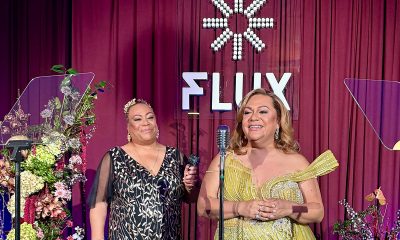West Hollywood
West Hollywood in brief- City government in action this week
Annual Rainbow Key Award, LGBTQ Arts Festival Continues Till End of Pride, Screening of film Patient No More, June is HIV Prevention Month
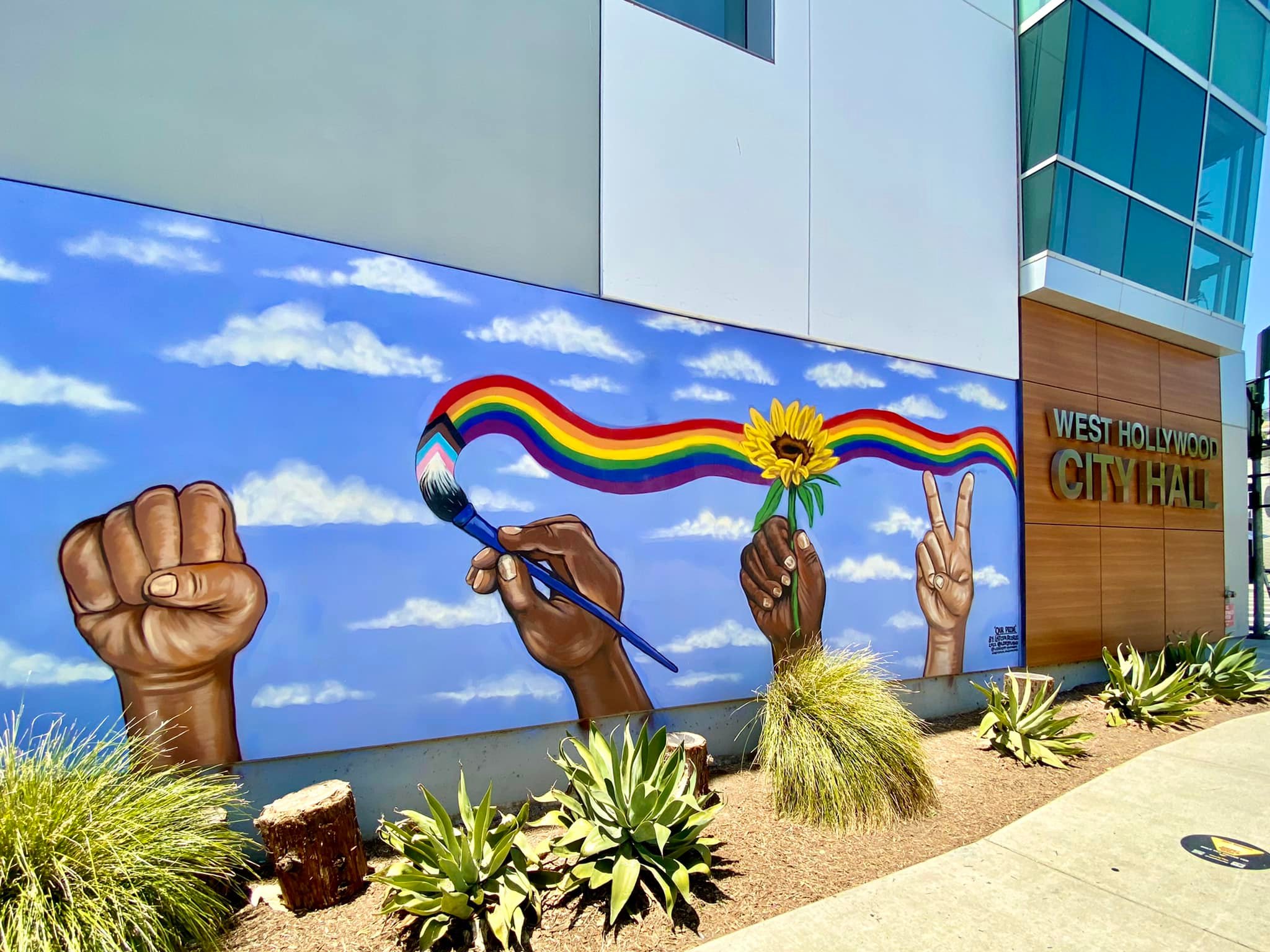
WEST HOLLYWOOD – The City of West Hollywood and its Lesbian and Gay Advisory Board will host a ceremony of the annual Rainbow Key Awards to recognize people and groups who have made outstanding contributions to the LGBTQ community.
This year’s Rainbow Key Awards will be held in-person on Wednesday, June 29, 2022 at 6 p.m. at the City’s Council Chambers/Public Meeting Room, located at 625 N. San Vicente Boulevard, adjacent to West Hollywood Park. Details about registering to attend the event are available by visiting the City’s website at www.weho.org/rainbowkey. The ceremony will also be available for viewing on the City’s WeHoTV YouTube channel at www.youtube.com/wehotv.
Each year, the West Hollywood City Council selects award recipients following recommendations made through a nomination process overseen by the City of West Hollywood’s Lesbian and Gay Advisory Board (LGAB).
This year’s Rainbow Key Awards honorees are: Jazzmun Crayton; Greg Hernandez; Damian Pelliccione, LaShawn McGhee, Alia Daniels, and Chris Rodriguez; Monica Trasandes; and, Amita Swadhin.
Celebration will Honor Those Who Have Made Outstanding Contributions to the LGBTQ+ Community
The City of West Hollywood has, since 1993, presented Rainbow Key Awards to people and organizations that have made outstanding contributions to the LGBTQ community. Previous honorees have included activists, artists, civic leaders, educators, community organizations, and many others. Contributions, whether by an individual or a group, may be in many forms, including the arts, community action, humanitarian action, sports, medicine, armed services, leadership potential, benefit to the global gay and lesbian community, or in other ways. More than 155 Rainbow Key Awards have been presented since the award’s inception.
Since incorporation in 1984, the City of West Hollywood has become one of the most influential cities in the nation for its outspoken advocacy on LGBTQ issues. No other city of its size has had a greater impact on the national public policy discourse on fairness and inclusiveness for LGBTQ people.
More than 40 percent of residents in West Hollywood identify as LGBTQ and three of the five members of the current West Hollywood City Council are openly gay or lesbian. The City has advocated for nearly four decades for measures to support LGBTQ individuals and has been in the vanguard on efforts to gain and protect equality for all people on a state, national, and international level.
For additional information, please visit www.weho.org/rainbowkey.For more information about the Rainbow Key Awards, please contact Moya Márquez, City of West Hollywood Community Programs Coordinator, at (323) 848-6574 or at [email protected].
For people who are Deaf or hard of hearing, please call TTY (323) 848-6496.
WeHo Pride LGBTQ Arts Festival Continues Through the End of Pride Month, June 30
Each year, the City of West Hollywood celebrates the artistic contributions of the LGBTQ community with its WeHo Pride LGBTQ Arts Festival (formerly known as the One City One Pride LGBTQ Arts Festival). The festival runs for 40 days, from Harvey Milk Day on Sunday, May 22, 2022 through Thursday, June 30, 2022, which marks the end of Pride month.
This year, some events will be presented in-person and others will be available online. All programming details are posted at pride.weho.org and there is a link to this site from www.weho.org/pride.
Some highlights of the remainder of the 40-day festival include:
- WeHo Reads: Pride & Joy in the Matrix – June 7, 2022 at 6 p.m. Free. Online, RSVP: www.weho.org/wehoreads. LGBTQ+ authors are taking a hard look at society IRL and virtually, pinpointing the ways we come up short in connecting with and loving each other.
- Pride Poets – “Pledge” Poetry Hotline – June 11, 2022 from 11 a.m. to 2 p.m. and again from June 11, 2022 at 11 p.m. to June 12, 2022 at 2 a.m. Free. Call (202) 998-3510. LGBTQ poets are standing by ready to tackle all your poetic needs! Call in and have an original poem created for you or a loved one. This year’s theme is “Pledge: come share your allegiances with us!”
- Vox Femina: A WeHo Tribute to Sondheim – June 12, 2022 at 3 p.m. at Congregation Kol Ami, located at 1200 N. La Brea Avenue in West Hollywood. Featuring songs from much-loved shows such as West Side Story, Into the Woods, Company, and many more, this lively concert celebrates one of Broadway’s most beloved and influential lyricists and composers, Stephen Sondheim! With performances from the full VOX ensemble, as well as dynamic solos, this joyful evening is not to be missed! This concert is supported in part by an arts grant from the City of West Hollywood. Free, Suggested Donation $10, RSVP required: https://www.eventbrite.com/e/a-weho-salute-to-sondheim-tickets-343385995757
- Q Con: A One Day Comic Convention Celebrating LGBTQ Comics – June 18, 2022 from 10 a.m. to 5 p.m. at Plummer Park’s Fiesta Hall, located at 7377 Santa Monica Boulevard. Free. Find an exciting, diverse selection of LGBTQ comics and graphic novels all in one place! Talk to creators, get autographs! Q Con is family friendly, and admission is free. Cosplay is encouraged. Join in the costume contest for fun and prizes! For the latest updates on Q Con, visit https://www.prismcomics.org/q-con.
- Gay Men’s Chorus of Los Angeles’ Tribute to QUEEN! – June 18, 2022 at 4 p.m. at Plummer Park, located at 7377 Santa Monica Boulevard. Free outdoor community concert. Members of the Chorus will sing a selection of iconic songs from Queen and Freddie Mercury, inspired by their recent hit concert QUEEN of the night. We Are the Champions, Somebody to Love and We Will Rock You are among the best pop/rock anthems ever written, and the Gay Men’s Chorus will bring them to life as you’ve never heard before in this special one-hour concert. Space is limited. For reservations visit https://gmcla.org.
- Trans Pride LA 2022: The VarieTy Show – June 18, 2022 at 7 p.m. RSVP required. Free. For more information and to RSVP: https://transpride.lalgbtcenter.org/. The VarieTy Show serves as the grand finale of the annual Trans Pride LA Festival.
- QUEER DIASPORAS: Lavender City of Dreams presented by Rubén Esparza and Queer Biennial – through August 19, 2022. Free. Online exhibition with some in-person events at ONE Gallery. Touching on issues of identity, activism, futurity, and beauty where queerness is the thread that weaves through all these personal – yet universal -perspectives. View the exhibition at www.lavendercity.art
- Season 2: Walking Amongst the Rubble: Undocuqueer Pride LA’s free monthly queer poetry reading series, Influx Collectiv: Queer Reading Series, welcomes season two of the Walking Amongst the Rubble: Undocuqueer Pride podcast. Season two includes poetry performances and interviews by LA-based award-winning undocuqueer poets Sonia Guinansaca, Lupe Limon Corrales, Jennifer Tamayo, and Jesus L. Valles. Episodes will be released weekly on Saturdays in June. Links available here: https://www.influxcollectiv.org/podcast.
More detailed information and a full list of the City of West Hollywood’s LGBTQ Arts Festival 2022 programming is posted at pride.weho.org and there is a link to this site from www.weho.org/pride.
2022 Festival Theme is: With Liberty, Diversity, Inclusion, and Progress For All
In addition, archived online programs from 2020 and 2021 are available to view. Among these is a collection of short films which tell the fabulous, fun, and deep LGBTQ history of the City of West Hollywood called the Stuart Timmons West Hollywood LGBTQ History Tour.
Acclaimed author/historian Stuart Timmons (author The Trouble With Harry Hay, co-author of GAY L.A., former executive director of the ONE National Gay & Lesbian Archives) was in the process of writing his West Hollywood LGBTQ History Tour as the final in a trio of walking tours (Downtown Los Angeles and Silverlake are the other two) when he suffered a debilitating stroke in 2008. The tour remained incomplete until the City of West Hollywood’s Arts Division funded its completion as part of the City’s 2015 LGBTQ Arts Festival, allowing Timmons and a small team to help finish his research, bringing it to completion as both a self-guided walking tour and a special in-person event featuring performance artists as tour guides. This fun and informative tour returned for two more years, and in 2021, was recorded as a collection of short films that can be viewed on the City’s WeHo Arts YouTube channel.
The WeHo Pride LGBTQ Arts Festival theme for 2022 is “With Liberty, Diversity, Inclusion and Progress for All” and this year’s festival poster was designed by Kaija Sydlowski through an open call poster competition which received submissions from around the world.
The City of West Hollywood’s #WeHoPride LGBTQ Arts Festival is organized by the City’s Arts Division. The City of West Hollywood is committed to providing accessible arts programming for residents and visitors.
The City of West Hollywood’s Arts Division delivers a broad array of arts programs including: Art on the Outside (temporary public art), Urban Art Program (permanent public art), Summer Sounds, Winter Sounds, the WeHo Reads literary series, Free Theatre in the Parks, Arts Grants for Nonprofit Arts Organizations, Library Exhibits and Programming, the City Poet Laureate Program, Human Rights Speakers Series and the #WeHoPride LGBTQ Arts Festival.
For additional information, please visit www.weho.org/arts. For more information about the City of West Hollywood’s WeHo Pride LGBTQ Arts Festival, please contact Mike Che, the City of West Hollywood’s Arts Coordinator, at (323) 848-6377 or at [email protected].
For people who are Deaf or hard of hearing, please call TTY (323) 848-6496.
City of West Hollywood to Co-Host Virtual Screening and Panel Discussion of Documentary Patient No More, Focused on Lesbian, Bisexual, and Queer Women’s Health
The City of West Hollywood, the Los Angeles County Lesbian, Bisexual, and Queer Women’s Health Collaborative, and the Iris Cantor-UCLA Women’s Health Education & Research Center will host a free virtual screening via Zoom of the documentary film, Patient No More, followed by a panel discussion with special guest speakers on Wednesday, June 15, 2022.
The film will screen at 4 p.m. and the panel discussion will follow at 5 p.m. The panel discussion will stream on the City’s WeHoTV YouTube channel. Register for the Zoom event at https://bit.ly/Pride2022-PatientNoMore.
This program is presented as part of the City’s WeHo Pride LGBTQ Arts Festival.
The Patient No More documentary explores the barriers that LGBTQ women navigate across healthcare systems and how the never-ending hunt for affirming care affects their lives. Focused on centering the experiences of queer and female-identified people, the film features the voices of 17 LGBTQ women who are health experts and patients.
The panel discussion will be moderated by Janet Pregler, M.D., Professor of Clinical Medicine, General Internal Medicine & Health Services Research, Director, Iris Cantor-UCLA Women’s Health Center, and Iris Cantor Endowed Chair in Women’s Health, David Geffen School of Medicine at the University of California, Los Angeles. Pregler is one of the founding members of the LA County LBQ Women’s Health Collaborative.
Film Screening will Take Place on Wednesday, June 15; Film Screens at 4 p.m., Followed by a Panel Discussion at 5 p.m.; Panel Discussion will Stream on the City’s WeHoTV YouTube Channel
The panel will feature Filmmaker Diana Fraser and panelists will include Angela Boger, Program Director, LA County Department of Public Health, Office of Women’s Health; Allison Cerezo, Ph.D., Assistant Professor, Dept. of Counseling, Clinical & School Psychology, UC Santa Barbara; Kaiyti Duffy, M.D., Chief Medical Officer, Los Angeles LGBT Center; and B.J. Rimel, M.D., Associate Professor of Obstetrics and Gynecology at Cedars-Sinai.
The panel participants will reflect on what actions need to be taken to make the healthcare system work for lesbian, bisexual, and queer women; the importance of intersectionality in considering health care; and how allies and supporters can work with lesbian, bisexual, and queer women to advocate for reducing health inequities and improving overall care.
Women’s health advocates, healthcare providers, health administrators, researchers, academics, policy experts, LGBTQ health supporters, and thought-leaders in this space – as well as leaders from community-based organizations, faith-based organizations, social service agencies, government agencies, and civic organizations – are all encouraged to register and attend.
The LA County Lesbian, Bisexual and Queer Women’s Health Collaborative grew out of the 2007 Women’s Health Summit, sponsored by the LA County Office of Women’s Health. At that time, lesbian and bisexual women’s (queer was added later) health was identified as a priority issue, specifically the health disparities faced by this population.
In 2008, the West Hollywood City Council adopted the Lesbian Health Bill of Rights, crafted by the City’s Lesbian Visibility Committee. Soon thereafter, the City of West Hollywood and the Office of Women’s Health convened a meeting of local stakeholders in lesbian and bisexual women’s health. Recognizing the need for sustained focus in addressing these health disparities, the LA County Lesbian and Bisexual Women’s Health Collaborative was established in 2009.
In 2019, the Collaborative changed its name to the Los Angeles County Lesbian, Bisexual, and Queer Women’s Health Collaborative. In addition to the development of educational materials, trainings and conferences, the Collaborative has compiled a Research Guide, a compilation of academic research on LBQ women’s health and continues to be updated with synopsis and support from the Iris Cantor-UCLA Women’s Health Education and Research Center.
The guide provides easy and credible references for researchers, academics and other interested parties. The Collaborative also previously conducted focus groups with under-represented lesbians and bisexual women – including women of color, veterans, seniors, and youth – to solicit their healthcare opinions and experiences.
The data from these focus groups has served as an important part of the foundation for improving cultural competency training opportunities for health care providers and administrators. For additional information about the Collaborative, please visit LA County Lesbian, Bisexual & Queer Women’s Health Collaborative.
For registration information, a full schedule, and details about event, please visit www.weho.org/calendar.For more information, please contact Jenny Ivanova, City of West Hollywood Strategic Initiatives Specialist, at (323) 848-6302 or at [email protected].
For people who are Deaf or hard of hearing, please call TTY (323) 848-6496.
June is HIV Prevention Month
The City of West Hollywood has declared June 2022 as HIV Prevention Month and, in May 2022, approved a Resolution to join the Global Fast-Track Cities Initiative. Each year, the City of West Hollywood declares the month of June as HIV Prevention Month, which provides an opportunity to increase awareness of community programs and the City’s HIV Zero Initiative.
With its Resolution, the City joins the Global Fast-Track Cities Initiative, a global partnership between cities and municipalities around the world and four core partners: the International Association of Providers of AIDS Care (IAPAC); the Joint United Nations Programme on HIV/AIDS (UNAIDS); the United Nations Human Settlements Programme (UN-Habitat); and the City of Paris.
Mayors and other city officials designate their cities as Fast-Track Cities by signing the Paris Declaration on Fast-Track Cities Ending the HIV Epidemic, which outlines a set of commitments to achieve the initiative’s objectives towards getting to zero new HIV infections and zero AIDS-related deaths. More than 350 cities across the world have signed the declaration to galvanize action among cities and municipalities, to share best practices, and to promote efforts to end HIV-related stigma.
The City of West Hollywood joins a consortium of other LGBTQ+ friendly cities and municipalities in the United States and globally to share best practices and engage in bidirectional exchanges that seek to promote the rights of all LGBTQ+ communities, including LGBTQ+ people living with and affected by HIV, irrespective of age, ethnicity and race, gender and gender identity, sexual orientation, and socioeconomic background.
HIV has affected West Hollywood’s community and the nation in a myriad of ways since the U.S. Centers for Disease Control and Prevention’s (CDC) Morbidity and Mortality Weekly Report (MMWR) described five cases of what later became known as AIDS were officially reported more than four decades ago on June 5, 1981. The City recognizes that some of the challenges in responding to HIV then are still challenges today.
The City of West Hollywood has historically supported efforts to facilitate equitable access to and utilization of HIV prevention, testing, care, treatment, and ancillary support services that respect the dignity and human rights of its citizens living with and affected by HIV. The City, in collaboration with community-based organizations, deliver critical services to its community members, including testing for HIV and other sexually transmitted infections, biomedical interventions, reproductive health services, health education, transgender advocacy and economic empowerment, and support programs for people living with HIV aged 50 and older.
Resolution Affirms West Hollywood’s Commitment to Ending the HIV Epidemic
The onset of the HIV/AIDS epidemic had a significant impact in West Hollywood. The disease’s elevated infection rate among gay men caused a devastatingly high number of deaths in the City. The City of West Hollywood was one of the first government entities to provide social services grants to local AIDS and HIV organizations. The City sponsored one of the first AIDS awareness campaigns in the country in October 1985 and the City’s response to the AIDS crisis has been recognized as a model for other cities, nationally and globally. The City actively participates in the development of programs that can bring awareness about the HIV/AIDS epidemic and services to people living with HIV/AIDS and the City has announced its vision to become an ‘HIV Zero’ city.
The City is currently implementing its HIV Zero Initiative Strategic Plan. For additional information about the City’s HIV Zero Strategic Plan, please visit www.weho.org/hivzero. Watch “Getting to Zero” on the City’s WeHoTV YouTube channel to learn more about the City of West Hollywood’s HIV Zero vision: https://youtu.be/LAR-pqY6CyY. For more information, please contact Derek Murray, Social Services Program Administrator, at [email protected] at (323) 848-6478.
For people who are Deaf or hard of hearing, please call TTY (323) 848-6496.
West Hollywood Secures Conditional Homekey Grant from the State to Establish an Interim Housing Program
The State of California has awarded the City of West Hollywood a conditional Homekey grant in the amount of $6,007,661 to address the capital and operating expenses for a proposed plan to convert the Holloway Motel site into an interim housing and supportive services location for people experiencing homelessness.
At its regular meeting on Monday, June 6, 2022, the City Council of the City of West Hollywood unanimously approved a Resolution approving the purchase of the Holloway Motel property, located at 8465 Santa Monica Boulevard, with $4,200,000 (plus closing costs) in unallocated reserves set aside in West Hollywood’s Affordable Housing Trust Fund. The Resolution initiates a purchase and escrow process.
Closure on the sale is subject to negotiation and preparation of a development agreement with the property owner, which will require Planning Commission review and approval by the City Council at a future public hearing. This follows prior approval, in December 2021, of $2,800,000 in unallocated reserves set aside in West Hollywood’s Affordable Housing Trust Fund dedicated as a local match to operating expenses at the proposed interim housing site.
The City of West Hollywood is committed to engaging with the community and to providing opportunities to share detailed information about the proposed project and to collect feedback from residents and businesses. Staff members from the City’s Strategic Initiatives Division will host several meetings about the proposed project. Two upcoming meetings about the proposed Holloway Motel/Homekey Housing Program will take place virtually via Zoom on Wednesday, June 22, 2022. One meeting will take place at 12 p.m.; the other meeting will take place at 7 p.m. Community members are encouraged to attend either session; information presented by the City will be the same content at each meeting. Details about Zoom sign-up are provided on the City’s website calendar at www.weho.org/calendar.
The City’s Homeless Initiative addresses homelessness with a multi-disciplinary, multi-agency, collaborative response and works in close partnership with the City’s contracted and collaborative nonprofit social services providers, the West Hollywood Sheriff’s Station, and Los Angeles County agencies.
The work of the Homeless Initiative is guided by the City’s Five-Year Plan to Address Homelessness in Our Community, which was approved by the West Hollywood City Council in 2018. The plan was developed based on extensive engagement with the community, and with funding support from LA County Measure H. The plan remains critically important in directing the local response to homelessness.
At its December 20, 2021 meeting, the West Hollywood City Council gave authorization to City staff to apply for a Project Homekey grant from the State of California’s Department of Housing and Community Development.
The proposed Holloway Motel/Homekey Housing Program envisions the purchase of the Holloway Motel to be updated, rehabilitated, and operated as an interim housing program, that will provide a comprehensive program for people who are experiencing homelessness to move off the streets with case management and supportive services, with the goal of identifying and securing permanent housing. Interim housing would typically provide a stay of up to 90 days to stabilize community members and assist them with getting the necessary care and resources to find permanent housing.
The City of West Hollywood is committed to providing comprehensive assistance to people who are experiencing homelessness in the City.
A survey conducted of West Hollywood residents in November 2021 by FM3 Research, found that 90 percent of respondents ranked homelessness as a very or somewhat serious issue (72 percent “very serious” and 18 percent “somewhat serious”) making this one of the most significant issues of concern for the community. The survey also found strong support among residents for interventions to address homelessness.
Of those surveyed, 79 percent of respondents supported increasing the prioritization of “Supportive Housing, including homeless services, within City limits” (52 percent “much more of a priority” and 27 percent “somewhat more of a priority”). 76 percent of respondents supported increasing prioritization of “City-funded temporary shelter beds and homeless services provided within City limits,” (50 percent “much more of a priority” and 26 percent “somewhat more of a priority”).
To report concerns about a community member who is homeless, call the West Hollywood Homeless Initiative Concern Line at (323) 848-6590. If the concern requires time-sensitive assistance during nights or weekends, please call the West Hollywood Sheriff’s Station at (310) 855-8850.
For more information about the Homeless Initiative, please contact Corri Planck, City of West Hollywood Strategic Initiatives Manager, at (323) 848-6430 or [email protected]. For additional information, please visit www.weho.org/homeless.
For people who are Deaf or hard of hearing, please call TTY (323) 848-6496.
City of West Hollywood Historic Resources Survey June 2022
The City of West Hollywood’s Current and Historic Planning Division has moved to Phase 2 of updating the 2008 historic context statement and historic resources survey for multi-family residential properties. Staff has completed a draft of the historic context statement as Phase 1. The 2008 statement and survey included 2,100 properties constructed before 1961. Phase 2 of the current project includes a reconnaissance survey of approximately 2,400 residential properties constructed before 1982 within the R2, R3, and R4 multi-family zoning districts.
Members of the community are invited to learn how to participate in the survey by attending the virtual Multi-Family Residential Historic Resources Survey kickoff community outreach meeting Wednesday, June 8, 2022 at 6 p.m. via Zoom at https://us06web.zoom.us/j/81517648718; Meeting ID: 815 1764 8718.
Reconnaissance surveys, commonly known as windshield surveys, document the physical qualities of the property, but make no formal evaluation as to a building’s significance, integrity, or eligibility to local, state, or national registers. In general, surveys usually begin at the reconnaissance level. After additional research and identification of property types, a smaller number of properties are selected for time-and-research-heavy Intensive surveys. An intensive survey requires more research and documentation of a property, and most significantly, results in the evaluation of a property’s eligibility for local, California, or National listing. Evaluation can apply either to individual properties or to properties within the context of a historic district.
2,400 Multi-Family Residential Properties Within R2, R3, R4 Districts Constructed Prior to 1982 will be Part of the Survey
Regularly updating historic resources surveys helps to ensure that properties that may have achieved significance since the time of the prior survey are not overlooked and also documents changes to the built environment that occur over time to better inform local planning and preservation efforts. Survey updates also provide an opportunity to identify and recognize properties associated with a broader, more complete history of a community.
The survey will be taking place in the R2, R3, and R4 multi-family zoning districts, as shown on the City’s zoning map. Members of the community are invited to share their knowledge of residential properties in these areas that are: important to the local community; associated with important events, individuals, organizations, and places related to the history of multi-family development; and, constructed after 1982 but may now be of exceptional historic significance. Community input will help the City of West Hollywood identify significant properties that embody the City’s heritage.
For a list of properties that are already designated for their historic significance, please see the City of West Hollywood’s Register of Cultural Resources at www.wehopreservation.org/designated-cultural-resources/.
For more information contact Antonio Castillo, City of West Hollywood Senior Planner, at [email protected] or at (323) 848-6854.
For people who are Deaf or hard of hearing, please call TTY (323) 848-6496.
West Hollywood
John Heilman and Danny Hang will serve as WeHo’s new Mayor and Vice Mayor
Last night, community members and local officials gathered to celebrate new leadership and bid a warm farewell to outgoing Mayor Chelsea Byers.
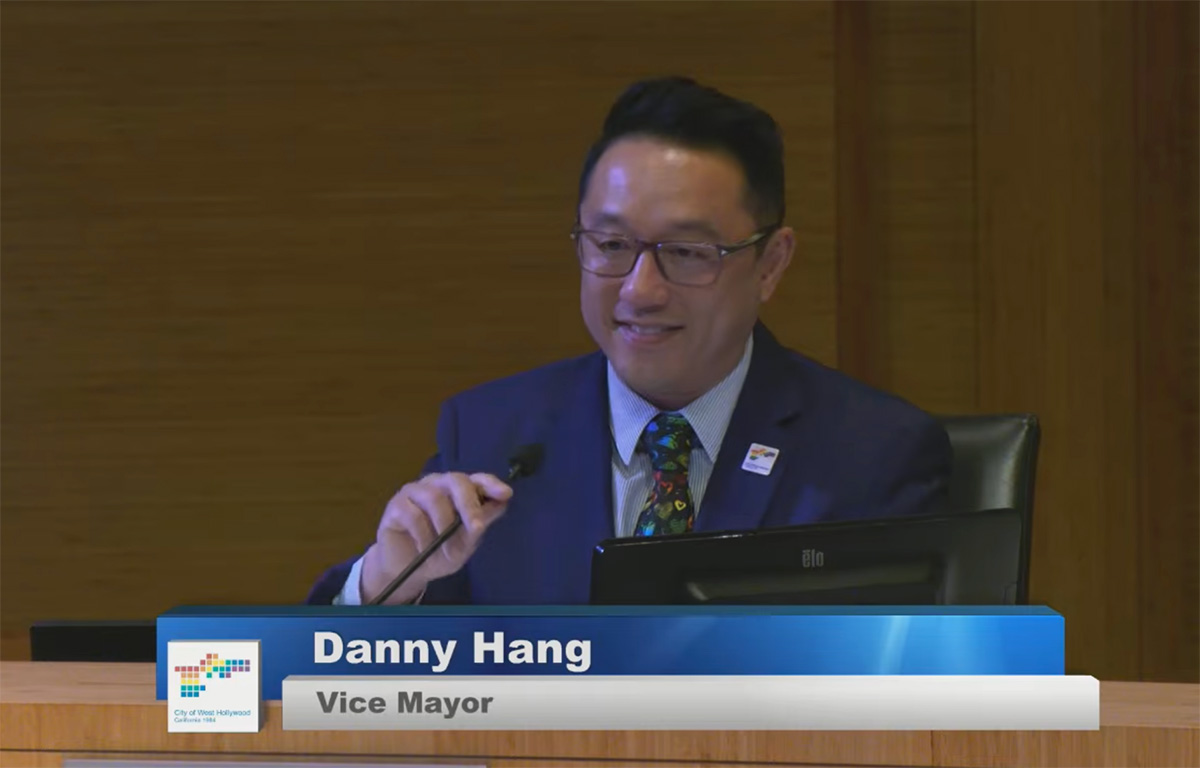
On Jan. 12, West Hollywood residents packed the City’s chambers at 6 p.m. to honor the work of outgoing mayor Chelsea Byers and witness councilmembers John Heilman and Danny Hang take their oath of office as they respectively assume their roles as Mayor and Vice Mayor for 2026.
In her last address as Mayor, Byers spoke about the optimism she holds onto in these unsteady times. To her, West Hollywood is a unique City: one that has become a model for what can be possible in an unjust society. “It’s us against the world. It’s West Hollywood on the stage,” Byers said. “It’s our story to tell, and every single person here contributes in such great ways to that.”
Byers was awarded a plaque on behalf of West Hollywood council members for her outspoken commitment to LGBTQ+ rights, economic justice, housing affordability, and policies that emphasize equity and inclusivity in West Hollywood.
Her leadership remains a bright, guiding light for Mayor Heilman, who was part of West Hollywood’s first city council after the independent city was incorporated in 1984. The spirit of that initial group remains today: queer, progressive, and led for and by the people. Yesterday’s ceremony marked the beginning of Heilman’s ninth time serving as Mayor, as well as his last year on the city council due to term limits.
Now, he leads side-by-side with a self-proclaimed “newcomer,” Danny Hang.
From the 626 to the Westside: Hang’s roots and journey
Hang was born in Monterey Park, a city in the San Gabriel Valley. The region is known for its diverse communities and AAPI-rich culture and history, and Hang recounted to the Blade the deep sense of belonging and comfort he felt growing up there. “I could go to a restaurant, speak Vietnamese or Chinese,” Hang said. “There are people who look like me out there. It is my home away from home.”
After college, he worked at the Social Security Administration, where he helped retirees, disabled people, and those impacted by loss file for Supplemental Security Income (SSI). The work was fulfilling, and he loved feeling that he had a tangible impact on others’ lives: that he could help residents grappling with difficult bureaucratic processes.
This passion grabbed the attention of L.A. County Supervisor Lindsey Horvath, who tapped Hang into serving on West Hollywood’s Disabilities Advisory Board in 2017. Hang eagerly accepted the role, having always been drawn to the vibrant, queer cultural hub. “WeHo was always the land of the unicorn: the land of magic,’ Hang told the Blade. “[This] was a town where I could be open, by myself, and find other people who were also LGBTQ+.”
After serving on the City’s Disabilities Advisory Board and, subsequently, the county’s Business License Commission, Hang noticed a lack of AAPI representation in local leadership. “There aren’t many AAPI people at all in West Hollywood. After I was on the commission, [I thought]: Hey, I think I want to run for city council,” Hang told the Blade.
Creating more inclusive leadership in WeHo
In 2024, Hang was elected to West Hollywood’s city council, becoming the first AAPI councilmember in the City’s 40 year legacy. “I want to see people who look like me in local government, because I want this community to be reflective of the modern-day people who live here. We’re a diverse community, and there’s no reason why we shouldn’t have people of color on the council, as well as more people of color appointed to our boards and commissions.”
Last night, local officials offered encouragement, support, and affirmation to Hang after he took his oath of office. “You’re already making history and certainly making waves across, not just your home region of the San Gabriel Valley, but certainly in California,” said Monterey Park councilmember Henry Lo.
Afterwards, Hang addressed the room, thanking residents, fellow council members and his family. “Standing here as the first AAPI elected to the West Hollywood City Council is deeply meaningful, and I couldn’t have done it without my parents. [They’re] right here in the front row,” Hang said. “My dad was a union worker, who showed me why standing up for workers matters. And my mom worked in a small business, owning a little nail salon in South Pasadena. She taught me what it means to care for others and to keep the community going.”
The year ahead: Heilman calls for residents to unite
Afterwards, Mayor Heilman spoke at length about the upcoming transitional year, the urgency of the current political climate, and ways that community members can step up to support each other. In his last term, he has set his eye on revitalizing the Sunset Strip, stabilizing rent and increasing housing affordability as well as examining the safety of the City’s foundational buildings, including the library and fire station.
He concluded his speech by making an unwavering stance on the “appalling” state of the federal government, stating that every West Hollywood resident must step up together in the face of ongoing federal attacks on the rights of LGBTQ+ people, specifically transgender people, as well as immigrants and other marginalized community members.
“This is a direct attack on our residents. It’s a direct attack on all of us,” Heilman said. “Now is not the time to hide. We need you…Ask what you can do to help people in the community,” he said, galvanizing residents to volunteer for the City’s various social services, nonprofits like Hollywood Food Coalition and Ascencia.
This call for unity and communal bravery echoes Byers’ belief in the courage of the people of West Hollywood. “41 years ago, a group of people defined what government could be,” Byers said. “We’re living the wildest dreams of people decades ago…and we get to be a bridge for that hope for the future. In such a critical moment, it’s truly our responsibility.”
Kristie Song is a California Local News Fellow placed with the Los Angeles Blade. The California Local News Fellowship is a state-funded initiative to support and strengthen local news reporting. Learn more about it at fellowships.journalism.berkeley.edu/cafellows.
West Hollywood
Administration refused to honor World AIDS Day; residents gathered with defiance, grief and love
Yesterday, members of the APLA Health Writers Group read moving stories to a large group of locals gathered at the AIDS monument.
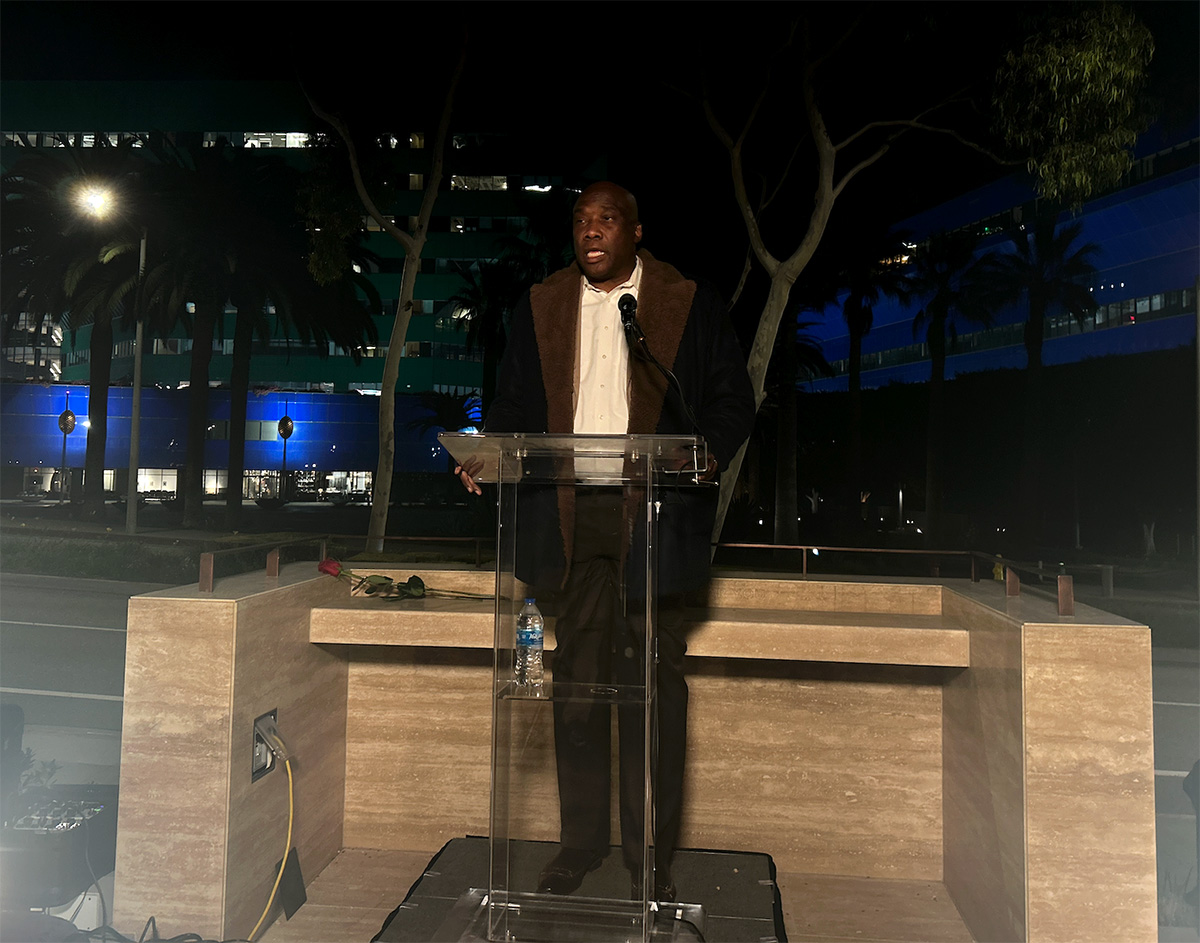
On Monday, the federal administration did not honor World AIDS Day, for the first time since the international awareness day was created in 1988. In addition to significant funding cuts to organizations focusing on HIV preventative treatment and care, the government’s halting of this commemoration perpetuates a dismissive system of inaction against LGBTQ+ people.
And yet, over 50 community members filled the empty spaces of West Hollywood’s AIDS monument yesterday evening, waiting in the night chill as city officials delivered impassioned statements and writers from APLA Health read personal pieces that centered a grief and love for those lost to the epidemic.
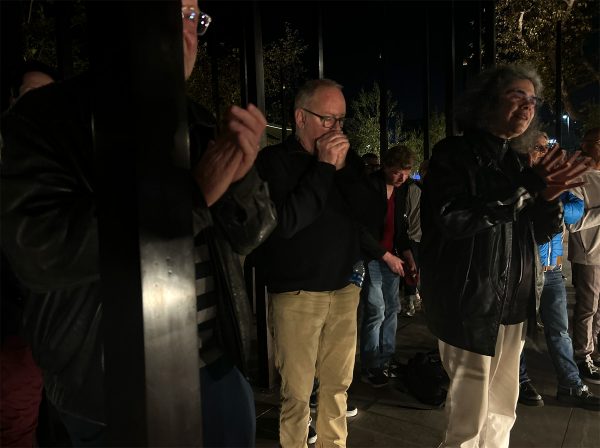
Before the readings began last night, West Hollywood vice mayor John Heilman asked for residents to join him in a righteous rage against administrative apathy. “I want to ask us all to reflect for just a moment about all of the people we lost…I want us to reflect and get angry,” said Heilman. “We have a fucking president who won’t even recognize World AIDS Day.”
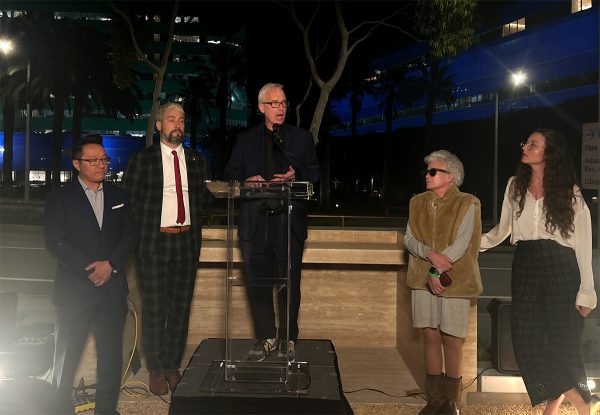
Irwin Rappaport, board chair for STORIES: the AIDS monument, echoed this immense disappointment. “Many of us here tonight lived through the 1980s, so we know what that’s like,” Rappaport said. “We also know that because of that neglect, because of that lack of caring from the federal government, we have to care for one another — and we know how to do that. When we don’t have recognition from others, we know how important it is to preserve our own history, to tell our own stories.”
Through heavy silence, five writers from APLA Health’s writers group stood tall before a podium and shared intimate writings they created about the epidemic and its personal impact on them. The collective was established in 1989 to provide an inclusive, expressive space for HIV-positive writers and allies to work on their writing and learn how to share their stories.
Writer Brian Sonia Wallace, who served as West Hollywood’s poet laureate from 2020 to 2023, has been working with the writers group for the last four years to help them hone and refine their narrative voices as they share their heaviest grief and the depths of their love for the people they lost to HIV and AIDS.
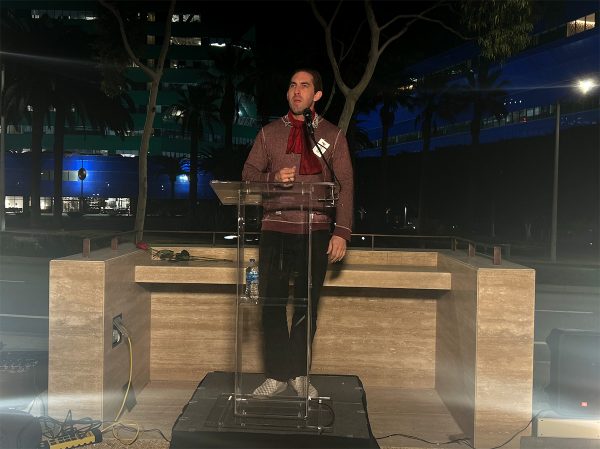
Hank Henderson, one of these writers, read from a diary entry from November 29, 1991. His voice, clear and strong, wavered as he shared about the death of his dear friend Richard. In a piece filled with lush, rich detail, painted clearly with a strong and loving voice, Henderson recounted a memory with Richard during the latter’s last years.
“The Santa Barbara sky is clear blue forever today…Yesterday came and went like a half-remembered dream between snooze alarms,” Henderson recited. “Last year, we walked to the beach. We spent hours there, played frisbee ourselves, brought the dog. Richard even yelled out 30-minute tanning turnover alarms. Yesterday, he took tiny, labored steps back to the car, used my shoulder to keep himself from falling over. Nobody said anything. We just pretend it’s normal.”
Another writer, Austin Nation, shared the story of being told he was HIV-positive at 26 years old. As a young nurse, he remembered the shock of seeing “young, beautiful men” arriving at the hospital covered in “purple, blotchy sores.” When he received his own test results, a paralyzing terror washed over his body. An incredulity followed the fear: why was this happening to him? “I got this thing for what?” Nation spoke. ”For having fun? For making love? And now it’s gonna cost me my life?”
But as he stood before the crowd, now 63 years old, he was met with applause and joy as he stated and repeated: “I’m still here. I’m still here.” The writers, in their grief and loss, have come to a place where they are able to share these stories, empowered and held. “In a world that writes off people with stories like mine,” Nation said. “It’s a hell of a good day to be alive.”
Kristie Song is a California Local News Fellow placed with the Los Angeles Blade. The California Local News Fellowship is a state-funded initiative to support and strengthen local news reporting. Learn more about it at fellowships.journalism.berkeley.edu/cafellows.
West Hollywood
West Hollywood kicks off community-focused programming for World AIDS Day
Since 1988, queer communities have come together on Dec. 1st to honor siblings and allies lost to the AIDS epidemic.
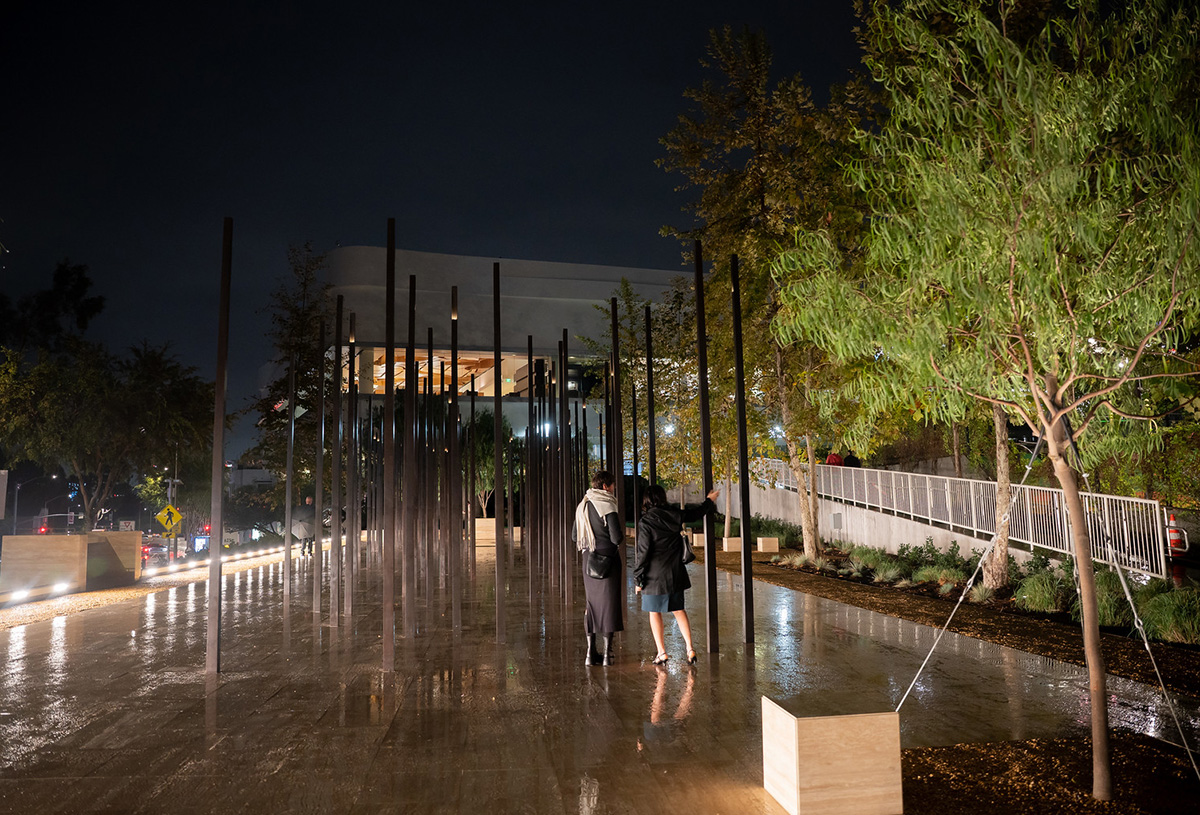
Since 1988, LGBTQ+ communities have come together on Dec. 1st to commemorate queer siblings and allies lost to the AIDS epidemic. This year’s World AIDS Day follows the theme “Overcoming disruption, transforming the AIDS response” and highlights the substantial funding cuts to research, health services, and community initiatives that have prioritized the safety of people with HIV and AIDS. The theme challenges people to think about “radical” ways to organize together and ensure that those who are impacted are able to access the care, treatment, and awareness that they need.
Beginning today, the City of West Hollywood is kicking off programming to recognize the historical transformation that local queer communities experienced during the AIDS epidemic. A panel from the AIDS Memorial Quilt will be available for viewing at the City’s Council Chambers at 625 N. San Vicente Boulevard through Monday, Dec. 15th.
Known as the largest community arts project in history, the Quilt is a powerful memorialization of loved ones who died during the epidemic. Each panel of the Quilt contains a story of remembrance, immortalizing a life cut short during the crisis. The project currently contains over 50,000 panels dedicated to over 110,000 people, all woven together in a 54-ton tapestry piece.
If you’re visiting the panel today, there will be an additional gathering opportunity tonight at the West Hollywood Park for STORIES: the AIDS Monument. From 5:30 to 8:30 p.m., members from the HIV-positive writers collective APLA Health Writers Group will present intimate readings that reflect on their experiences. Community members will be allowed time to wander through the monument and also preview the new Herb Ritts: Allies & Icons exhibition at ONE Gallery after the program. The art show includes striking black and white portraits of activists who stood in alliance with those most impacted during the AIDS epidemic.
Additionally, fresh flowers will be placed on the bronze plaques that line the City’s AIDS Memorial Walk. During the AIDS epidemic, West Hollywood was at the center of a rampant grief and loss that juxtaposed vibrant programming and efforts that boosted healing and fought against stigma and violence. It continues to be a vibrant space that houses various organizations and memorial spots that continue to uphold the revolutionary history and advocacy work that has continued since the epidemic’s beginnings.
Today, West Hollywood is in the process of executing its HIV Zero Strategic Plan, an initiative that began in 2015. Its goals include: expanding healthcare access for people living with HIV and AIDS, reducing the rate of infections, lessening health disparities and inequities for those impacted, and slowing the disease’s progress from advancing to AIDS.
According to West Hollywood mayor Chelsea Byers at a recent Cityhood event, the initiative carries forth the City’s “bold vision” and commitment to ensuring marginalized community members living with HIV do not face the life-threatening discrimination and health barriers that their elders experienced.
To learn more about the City’s programming, read here.
Kristie Song is a California Local News Fellow placed with the Los Angeles Blade. The California Local News Fellowship is a state-funded initiative to support and strengthen local news reporting. Learn more about it at fellowships.journalism.berkeley.edu/cafellows.
West Hollywood
Today, West Hollywood celebrates 41 years of queer cityhood
WeHo’s city officials are trying to preserve the fight for queer safety and rights that began decades before.
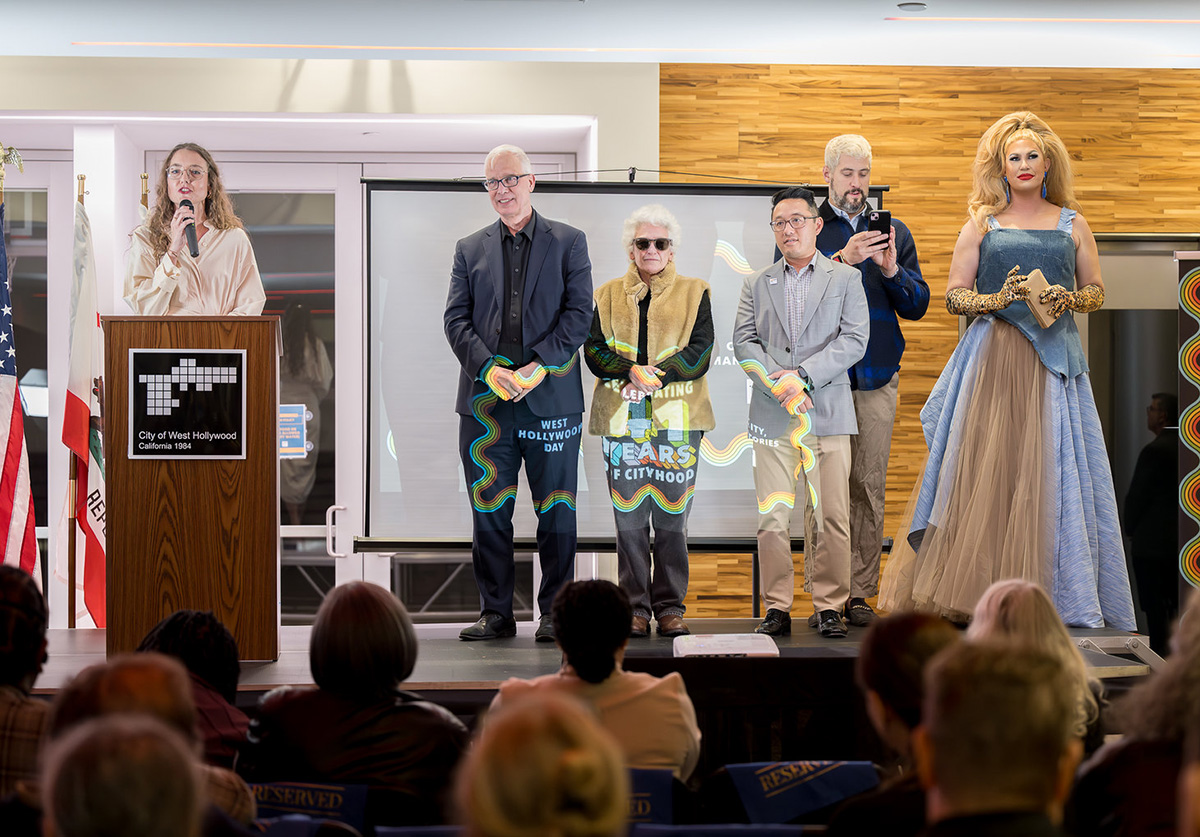
On Nov. 29th, 1984, West Hollywood was incorporated as an independent City, making its sovereignty official and solidifying it further as a sanctuary for LGBTQ+ community members, their stories, and their freedoms. Inspired by other prominent gay neighborhoods like New York’s West Village and San Francisco’s Castro District, West Hollywood was established by local queer advocates and residents. Their first city council was made up of a majority gay governing body — the first in the world, according to the West Hollywood History Center.
This political legacy, and the city’s vibrant and proudly queer history, continues to be preserved. On Monday’s celebratory event, West Hollywood mayor Chelsea Byers announced that the City’s current council “continues to be a majority-LGBTQ+ body,” holding tightly onto a “spirit” that reflects, prioritizes, and fights for Los Angeles’ queer community.
West Hollywood has been through various transformations, cocooning and revitalizing itself through the country’s evolving political and cultural upheavals. It has long been home to a ravishing nightlife that celebrates LGBTQ+ expression, and was a focal point for queer-led liberation and activism in the late 1960s and early 1970s. Trailblazers like Morris Kight led the first gay pride march through West Hollywood’s streets in 1970 and opened the Los Angeles LGBT Center to nourish the City’s robust and blossoming queer communities.
Today, West Hollywood continues to be the place where queer organizers and residents plant roots. Earlier this month, STORIES: the AIDS monument opened up in the City’s park after over a decade of work, shining a light on the legacies of gay activists, artists, historians, and community members who fought to survive as anti-gay stigma led to the erasure of their rights and lives.
As waves of anti-LGBTQ+ hate and violence continue to surge through the country, West Hollywood elected officials aim to continue doing the critical work that began decades before them: the work that protects the ability of queer residents to advocate for themselves, to live with protections and dignity, and to relish in joy. Mayor Byers is inspired by the resilience of the community members who stood together to establish this independent City in 1984. “The people who lived here…wanted a city with strong protections for renters, with progressive policies, and with a local government that would actually reflect and protect the people who call this place home,” said Byers, at the Nov. 24th celebration.
Over 40 years later, these needs have not changed. The way forward? Remembering and fighting for that initial promise and hope. “We are a chorus. We are a tapestry,” said Byers. “We are the product of thousands of people who, for more than four decades, have dared to say: We can build something better here.”
Kristie Song is a California Local News Fellow placed with the Los Angeles Blade. The California Local News Fellowship is a state-funded initiative to support and strengthen local news reporting. Learn more about it at fellowships.journalism.berkeley.edu/cafellows.
West Hollywood
From nickname to reality, the Rainbow District is made official by the City of West Hollywood
The mile along Santa Monica Boulevard from N. Doheny Drive to N. La Cienega Boulevard welcomes residents and visitors to come as they are
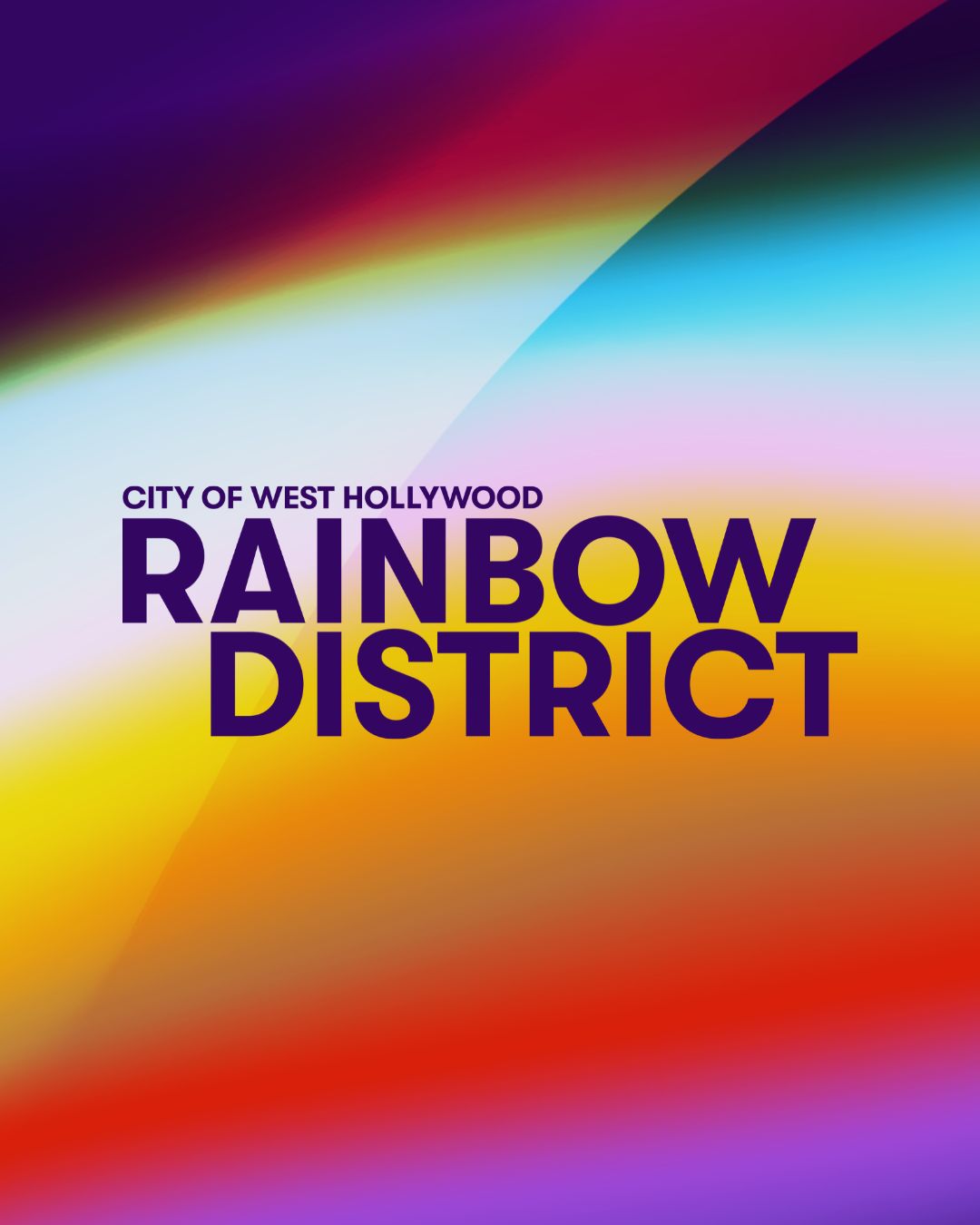
Even in today’s political climate, we will not be hidden.
The vibrant stretch on Santa Monica Blvd of over 50 local businesses, representing the full spectrum of LGBTQ+ expression, from N Doheny Dr to N La Cienega, has had the loving nickname of the Rainbow District for decades. Well, now it’s official. From nightlife to restaurants to community organizations, the City of West Hollywood has formally designated the space as such, honoring the neighborhood’s legacy as a safe haven for the queer community and beyond.
In addition to making the name official, the Rainbow District is being launched with a full range of social media, including Instagram, TikTok, and Facebook, keeping the residents and visitors updated on all upcoming events and happenings in the neighborhood.
Long known as a beacon of acceptance, inclusion, and visibility, where everyone is welcome, this iconic mile-long corridor is now formally recognized for what it has always been: a place where people from every walk of life can come together, be themselves, and celebrate the beauty of diversity.
City of West Hollywood Mayor Chelsea Lee Byers states, “For generations, the City of West Hollywood’s Rainbow District has been a place where LGBTQ+ people take their first steps into living openly, where the warm embrace of community is found at every turn, and where the joy of living out, loud, and proud fills the streets. The City’s official designation of the Rainbow District honors both the legacy and the future of this vibrant neighborhood, home to beloved entertainment venues, bars, and restaurants that have long served as cornerstones of LGBTQ+ life. Today, the Rainbow District is more alive than ever, and it will always stand as a beacon of hope, pride, and belonging and as a reminder that everyone deserves a place to celebrate joy, to be seen, and to be supported.”
The Rainbow District officially joins a nationwide list of iconic LGBTQ+ landmarks. West Hollywood will not be hidden amid political backlash and will continue to protect queer spaces, uplift queer voices, and foster a safe and joyful environment for all.
“This designation is not only a celebration, but it also serves as a promise,” said Visit West Hollywood President & CEO Tom Kiely. “A promise to keep LGBTQ+ spaces visible, valued, and vibrant for generations to come. As the Rainbow District continues to evolve, it will remain a place where locals and visitors alike can connect through culture, creativity, and community. The City’s formal designation affirms its significance and highlights The Rainbow District as the ultimate playground for travelers seeking a unique, inclusive, and authentic experience.”
The Rainbow District will be home to upcoming community events that include:
- Winter Market & Ice Skating Rink — December 2025
- Go-Go Dancer Appreciation Day — March 2026
- Harvey Milk Day — May 22, 2026
- WeHo Pride Weekend & the OUTLOUD Music Festival at WeHo Pride — June 5–7, 2026
Follow the Rainbow District on socials to discover local happenings, support small businesses, and be part of a neighborhood that celebrates every person for exactly who they are.
Instagram: @RainbowDistrictWeHo TikTok: @RainbowDistrictWeHo
Facebook: facebook.com/rainbowdistrictweho More Info: visitwesthollywood.com/rainbowdistrict
West Hollywood
West Hollywood’s AIDS Monument preserves the pain and power of people lost to the crisis
STORIES: The AIDS Monument is now available to view at West Hollywood Park, 15 years after its conception.
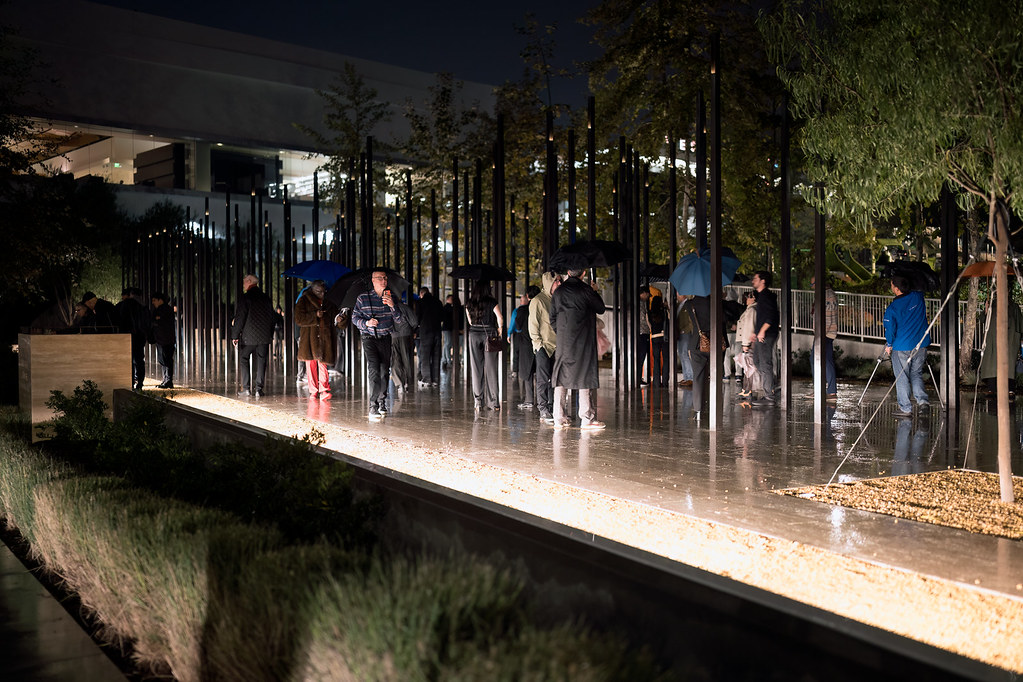
It was 1985, at the height of the AIDS crisis, when Irwin Rappaport came out as gay. As he came to terms with his identity, he witnessed people around him grow weaker: their faces becoming gaunt, painful lesions developing on their bodies. Five years later, he began volunteering as a young lawyer at the Whitman-Walker Clinic, a community health hotspot in Washington, D.C. that created the first AIDS hotline in the city, opened homes for patients with AIDS, and distributed materials that promoted safe sex.
The work being done at the clinic was instrumental, essential, and deeply painful. “When you see that sickness and experience that death among your friends and people you know, and when you’re writing wills for people who are much too young in ordinary times — it has an impact,” Rappaport told the Blade. “And even though in 1996 we saw life-saving medications come around, you never forget the sense of fear that permeates your life. The sense of loss.”
Determined to honor and share the legacies of people who died from AIDS, Rappaport joined the Foundation for the AIDS Monument (FAM) board to work towards the organization’s goal of creating a physical monument dedicated to memorializing these histories. FAM treasurer Craig Dougherty first conceived of this project in 2010 and, after 15 years, STORIES: The AIDS Monument is now available to the public for viewing.
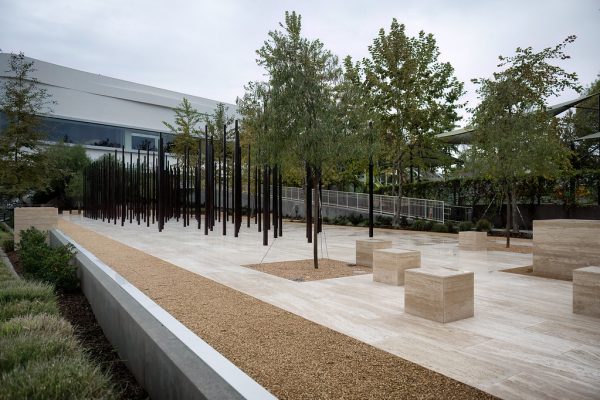
Created in collaboration with the City of West Hollywood, STORIES: The AIDS Monument is composed of 147 vertical bronze pillars known as “traces.” Designed by artist Daniel Tobin, 30 of these traces are engraved with words like: activism, isolation, compassion, and loss, which correlate to the over 125 audio stories collected and archived on the foundation’s website. This multimodal storytelling allows people who come across the monument to engage more intimately with the people represented by these physical pillars.
At nighttime, lights transform the monument into a candlelight vigil, providing a warm glow to a wanderer’s journey through the structure.
When people were able to walk around the traces at Sunday’s grand opening ceremony at the Pacific Design Center, the last remnants of the weekend’s rainstorm created a kind of “spiritual” and reverent atmosphere for those gathering, according to Rappaport. “I think there’s a certain peacefulness and serenity about the design, an opportunity for reflection,” he continued. “For some, it may bring back incredibly painful memories. It might bring back wonderful times with friends who are no longer here. It might remind them of their own caregiving or activism, or the sense of community that they felt in striving with others to get more attention to the disease.”
Now that the monument has been built, FAM has passed the mantle of management and programming to One Institute, a nonprofit that engages community members with queer history through panels, screenings, and other educational initiatives. One Institute plans to host monthly docent tours, art installations, and other special events during various LGBTQ+ national awareness days, including the upcoming World AIDS Day in December.
Rappaport also hopes to do outreach with local schools, so that young students are able to engage with the monument, learn about the people who were affected by the AIDS crisis, and interact with the ripples of transformation that this time period sparked in politics, research, the arts, and within society. “For younger people, I think [this is] an invitation for them to understand how they can organize about issues that they care about,” Rappaport said. “[So] they can see what the HIV and AIDS community did as a model for what they can do to organize and change the world, change culture, change law, change politics, change whatever they think needs to be changed. Because we had no other choice, right?”
West Hollywood
West Hollywood invests $1 million to build LGBTQ+ Olympic hospitality house
Pride House LA/WeHo will be an interactive space for queer athletes and allies to celebrate the 2028 Summer Games together.
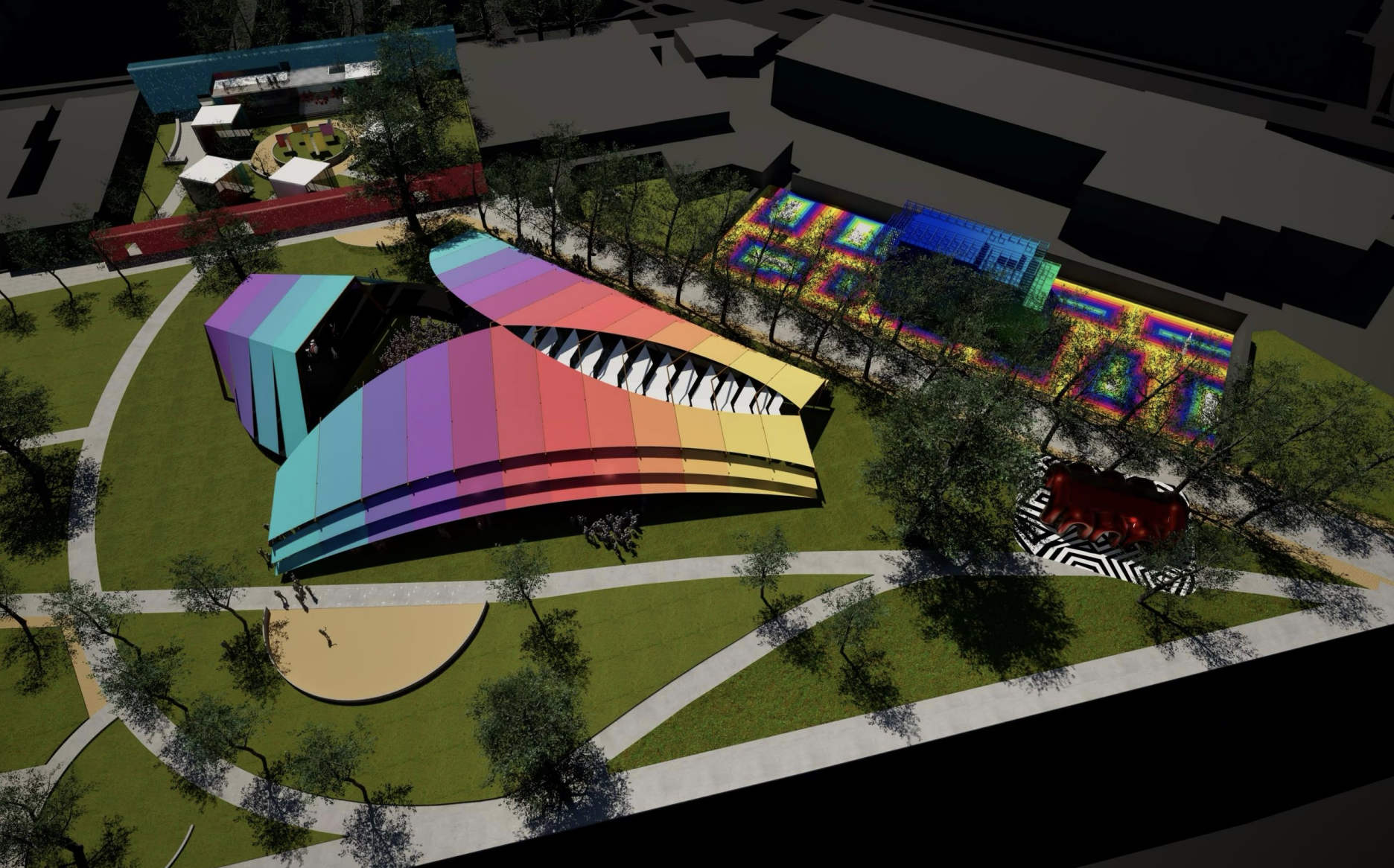
The first-ever Olympic hospitality house began with humble roots in 1992: a tent pitched on the Port of Barcelona for athletes to gather with their families. Since then, they transformed into fixtures of several major sporting events, with hopes of fostering belonging and safety for athletes of various cultural backgrounds.
It wasn’t until 2010 that the first LGBTQ+ hospitality house, the Pride House, appeared during the Winter Olympics in Vancouver. Over the years, its existence and visibility have faced barriers. During the 2014 Sochi Winter Olympic Games in Russia, Pride House International was denied from organizing its safe hub. The rejection was a blow to the visibility and safety that the organization was trying to promote and create for queer athletes. But this didn’t go unnoticed. International fans demonstrated quiet resistance, hosting remote Pride Houses in support of the Olympians who were barred from openly communing and celebrating together.
As Los Angeles prepares to host the Summer Olympics in July 2028, Pride House is coming back stronger than ever. In early October, the West Hollywood city council approved an agreement that would allocate $1 million to sponsor Pride House LA/WeHo as they prepare to build a temporary structure at West Hollywood Park for the 2028 Games. For 17 days, vibrant LGBTQ+ sports programming will fill the park’s grassy knolls.
Pride House LA/WeHo CEO Michael Ferrera detailed at a Nov. 1st Out Athlete Fund fundraising event that the team plans to build a concert stage to seat over 6,000 people. There will also be a museum that will take viewers through 100 years of queer Olympics history, viewing areas for people to watch the games, and a private athlete village for queer Olympians. “The dream of that is — imagine you’re an athlete from a country where you can’t be out,” said Ferrera. “You come here, and you can be safe and sound.”
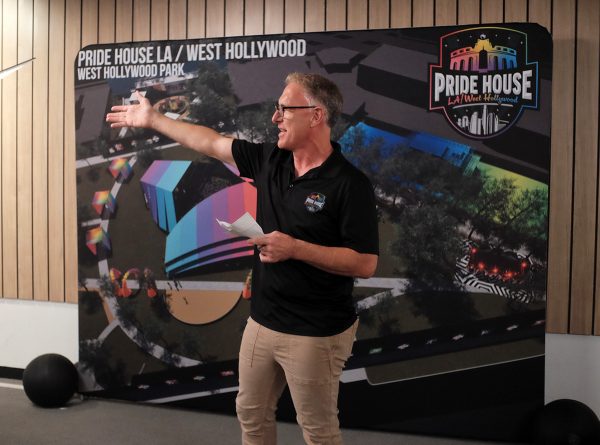
As outlined in the city council agreement and stated by Ferrera, most of the programming will be free and open to the public, and in the heart of a neighborhood that many of the county’s queer residents recognize as their safe haven. “We’re centering this important event in West Hollywood Park where our community has come together for decades in celebration, in protest, to support each other and to live our lives,” Pride House LA/WeHo CEO Michael Ferrera wrote to the Blade. “There is no place that is more representative of inclusion and safe spaces.”
The City of West Hollywood is promoting this inclusion further by asking for local community members to voice their perspectives on the formation of Pride House LA/WeHo at West Hollywood Park. On Monday, a community conversation will take place at Plummer Park to encourage residents to help shape the cultural programming that will take place in the summer of 2028. Another conversation will take place on Nov. 21st at the City’s 40th anniversary of Cityhood event.
“We couldn’t do this without the generosity and partnership of the city of West Hollywood,” Pride House LA/WeHo marketing co-lead Haley Caruso wrote to the Blade. “We are so happy to help bring the Olympic spirit to West Hollywood while also providing the community a safe and entertaining venue to enjoy the Games.”
Head to PrideHouseLAWeho.org for more information
West Hollywood
Drag performers delight Carnaval crowds with demure and daring dances
The Halloween party is one of the most anticipated events for queer Angelenos.
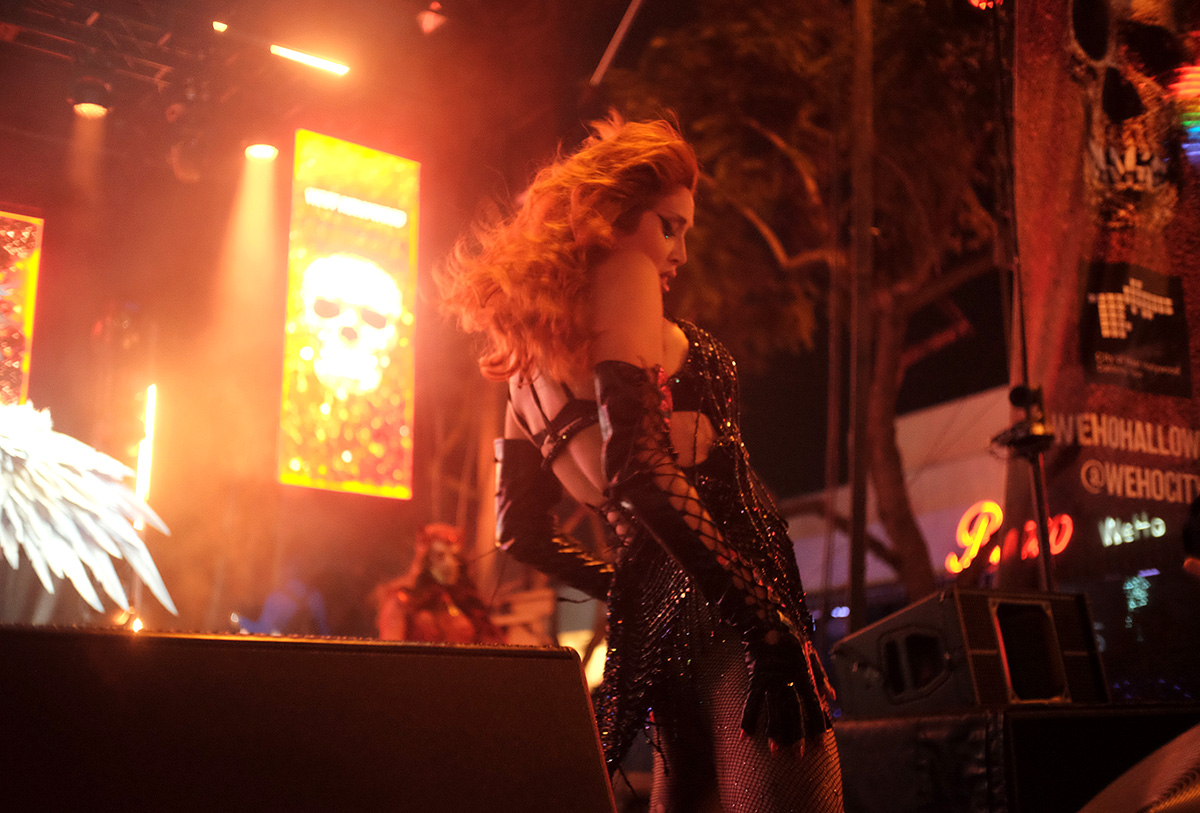
On Friday night, techno pop remixes surged through a tight block on Santa Monica Boulevard, where hundreds of eager partygoers danced near a pop-up stage. Bass-heavy grooves echoed across neighboring streets as Beetlejuices, angels, and vampires swayed and thumped to the beat.
Oct. 31 marked the arrival of West Hollywood’s annual Halloween Carnaval, one of the county’s citywide celebrations — and one of the most anticipated for queer Angelenos.
The first Halloween Carnaval was celebrated in 1987, and has since become one of the most awaited nights for local queer celebration. Drag performers donning elaborate costumes and glamorous makeup set the stage ablaze as they strutted, flipped their hair and danced to the cheers of a crowd that grew enormously as the night went on. The energy was infectious, and the Los Angeles Blade was on the scene to photograph some of these moments.
Image captures by Blade reporter Kristie Song.
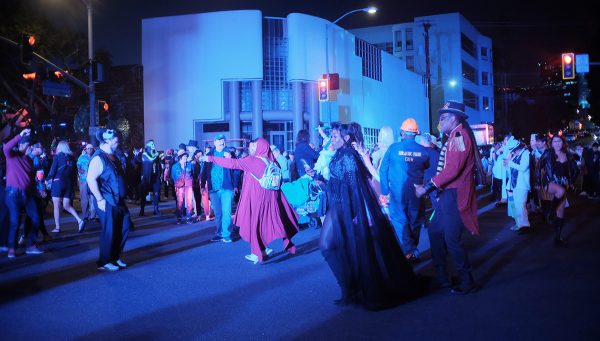
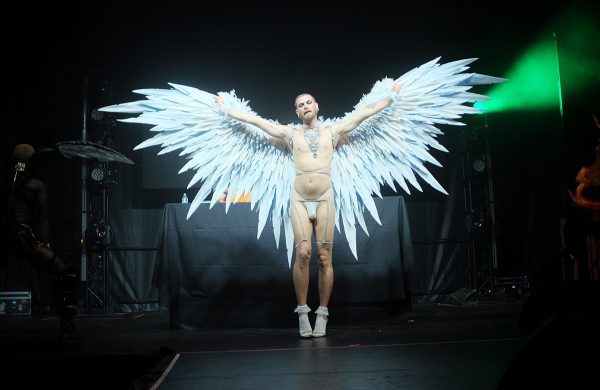
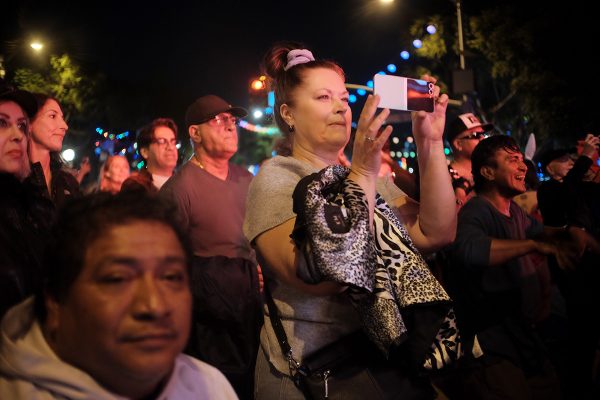
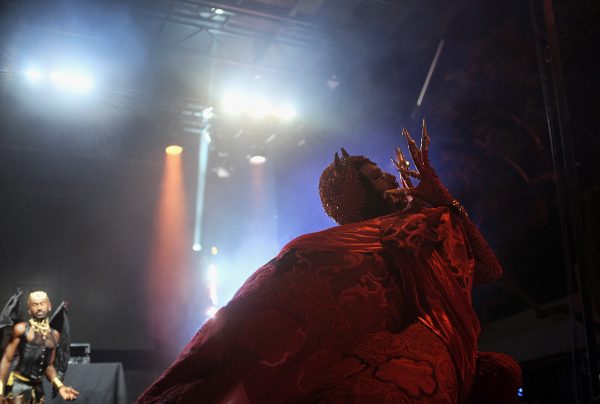
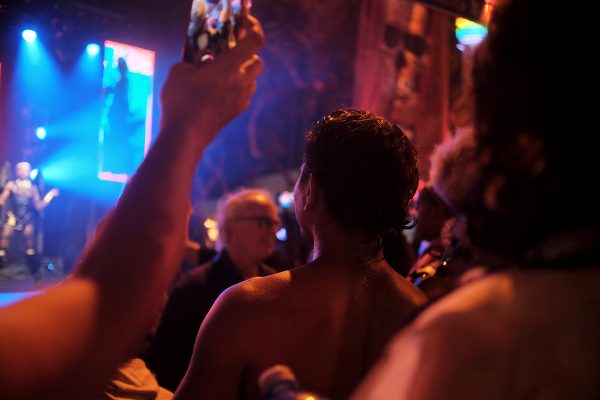
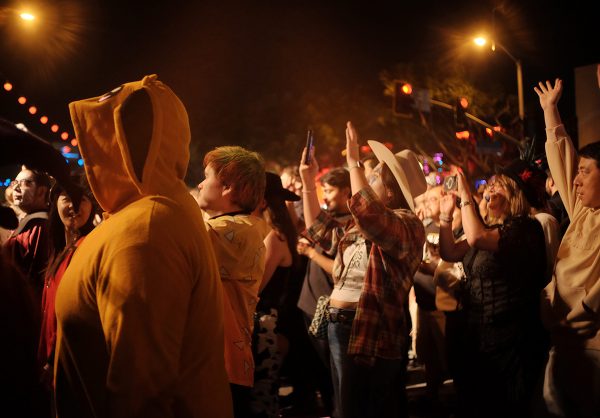
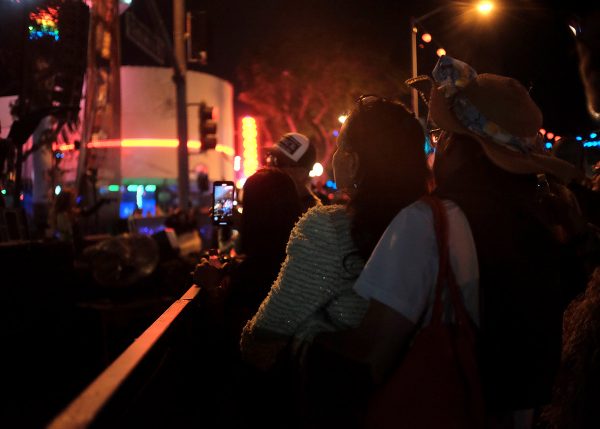
West Hollywood
West Hollywood installs new intersex pride flags on Intersex Awareness Day
On Sunday, city councilmembers gathered to raise two new pride flags to honor intersex community members
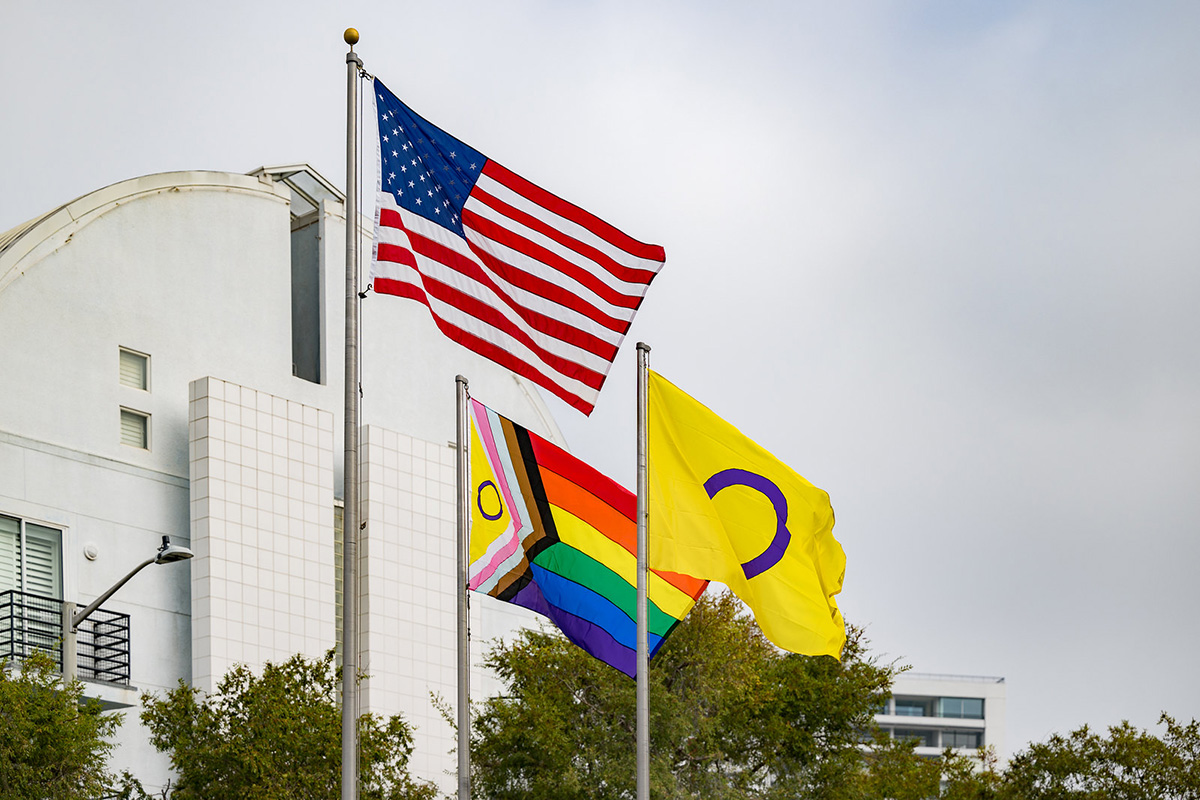
Early yesterday morning, on National Intersex Awareness Day, West Hollywood mayor Chelsea Byers, Vice Mayor John Heilman, as well as councilmembers Danny Hang and John M. Erickson gathered to install and raise two new intersex pride flags. They fly side by side with the American flag, upholding the City of West Hollywood’s vision of solidarity between national pride and LGBTQ+ visibility.
“We are facing unprecedented attacks on our community. It is important that we recognize the entirety of the LGBTQI+ community,” Vice Mayor John Heilman wrote to the Blade. “Intersex people have long been ignored and their issues disregarded. Raising the intersex flag also raises awareness about the challenges many intersex people face.”
Intersex people are born with naturally occurring variations in reproductive and sexual anatomy that don’t fit into binary “male” or “female” categorizations. As Planned Parenthood details, this can look like having both ovarian and testicular tissues or having combinations of chromosomes that aren’t “male” or “female,” just to name a few. According to the Human Rights Campaign Foundation, one of the biggest issues intersex people face is non-consensual surgeries performed when they are children. These operations are considered medically unnecessary and can leave lasting physical and psychological damage on intersex youth.
The fight for bodily autonomy and intersex visibility was the main reason behind the first action organized by intersex advocates and trans allies on Oct. 26th, 1996. Protestors stood outside the Boston Convention Centre, passed out leaflets, and spoke with clinicians, nurses, and other medical professionals attending the annual American Academy of Pediatrics conference.
One of the main leaders behind this movement was Morgan Holmes, an intersex woman who had experienced a violating medical procedure meant to “correct” her anatomy. In May of 1996, she presented testimony in a room adjacent to a symposium on genital surgery for intersex infants, a conference she and other members of her advocacy group had been rejected from.
“What I am saying is that my medical ‘care-givers’ failed to respect my autonomy or my intelligence when they assumed that because I was a child, they could do whatever they wanted as long as my father provided his consent,” Holmes said. “And when I began to balk, instead of questioning their own treatment of me, they blamed my body, and they cut it up.”
Today, intersex people and their stories are more broadly recognized, but still struggle to reach mainstream audiences when it comes to discussions around LGBTQ+ identity. West Hollywood city officials see this addition of intersex pride flags as a step forward. “Updating our city’s flags was my item because visibility matters,” councilmember John M. Erickson wrote to the Blade. “Intersex people have always been part of our story, and it’s time that their history, identity, and pride are recognized in the public spaces that belong to all of us.”
West Hollywood
Residents remain dubious as officials claim “no ICE involvement” at The Abbey
The Oct. 17th “undercover operation” was addressed at the latest city council meeting
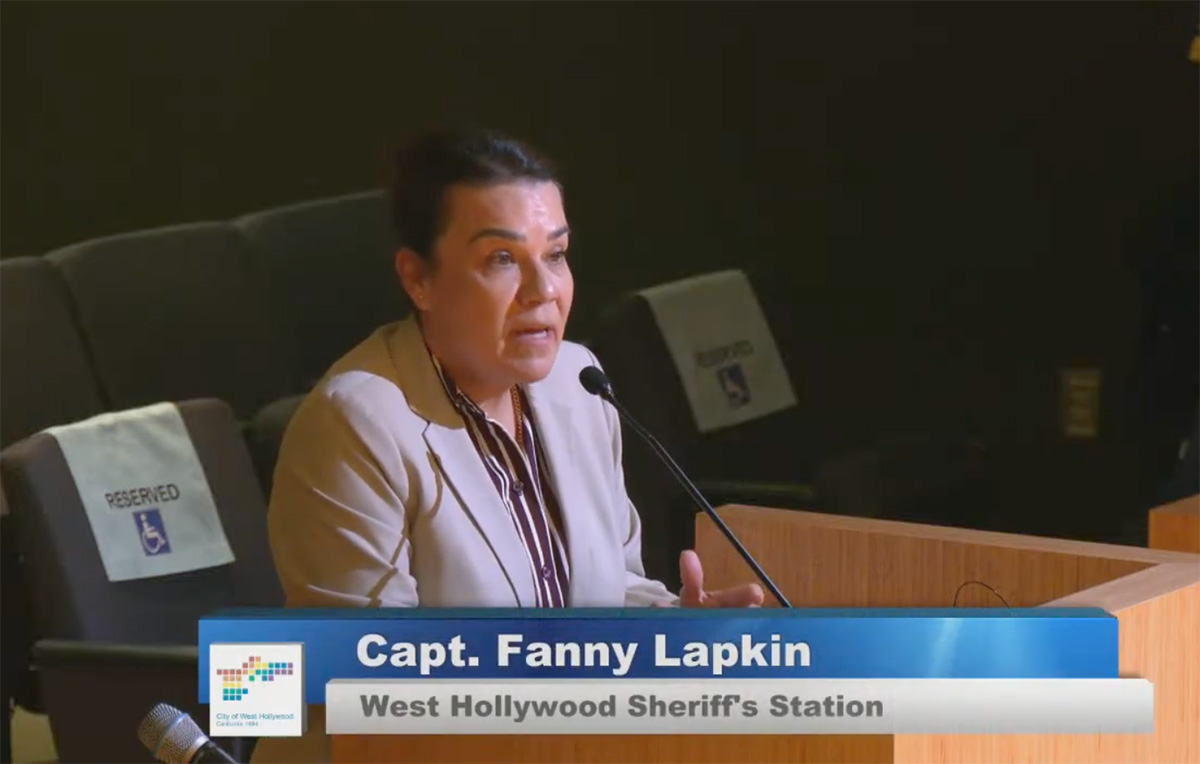
On Friday, Oct. 17th, West Hollywood gay bar The Abbey found itself in the center of a social media storm as clips were shared depicting the presumed presence of federal Immigration and Customs Enforcement (ICE) officers. In a video posted on Oct. 18th by Charles Hernandez, who often creates content around gay nightlife in Los Angeles, several people are seen standing in a line as they are apprehended and handcuffed by officers wearing sheriff’s vests and tees. Hernandez noted that, while dressed in varying attire with the word “sheriff” on it, none of the officers were willing to identify themselves or present their badges upon request.
Hernandez can be heard asking the officers about the cause for arrest, to which one responded: “I don’t have to tell you our cause.” The video creator also questioned another officer, who can be seen wearing a gaiter to cover his face. “Isn’t it illegal to wear a mask in California?” Hernandez asked. “He has COVID,” an officer replied. In September, Governor Newsom signed five bills that weakened federal agents’ abilities to access school sites and health facilities, and prohibited them from hiding their identities. More specifically, SB 627 requires all California law enforcement agencies to create written policies limiting their officers’ use of facial coverings by July 1, 2026.
As this video circulated around the web, the West Hollywood Sheriff’s Station released an online statement of their own, denying allegations that the officers present were federal immigration officers. The station also claimed that the night’s events were a result of an “undercover operation” that was conducted in response to reports made about pickpocketing and the transportation, use, and sale of illegal substances. “Several arrests were made,” the statement read. “ICE was not involved.”
Still, residents remained unconvinced, criticizing the station’s lack of transparency, careful conduct, and accountability. Over 50 people took to the comments of this statement to voice their discontent. “[It] was not that long ago when officers would raid LGBTQ spaces and arrest people simply for being there,” one comment read. “A raid such as this does not inspire feelings of safety for our community. Especially in times when people are being kidnapped off the street by masked federal agents. There simply must be a better response to pickpockets and “other criminal activity” than undercover raids by masked officers and transporting detainees in unmarked vehicles. DO BETTER.”
Two days later, at the West Hollywood city council meeting, West Hollywood Sheriff’s Station Captain Fanny Lapkin took to the podium to address some of these concerns. Echoing the station’s Instagram statement, Lapkin confirmed that the “pre-planned operation” was created in response to “concerns from our businesses and our community in regards to the pickpocketing, to the narcotics, and also to the illegal vending and some of the criminal activity during illegal vending.” Lapkin also confirmed that no federal agents were present, stating that everyone who took part in the operation was “sheriff’s department personnel.” And because the arrests were made as part of a planned operation, Lapkin further stated that warrants were not “necessary.”
The events were discussed with brevity at the meeting, but community ire has not been dispelled. Several people continue to question the ethics of this undercover operation: Why were the individuals being arrested not clearly told the reason for their detainment? Why were unmarked vehicles present? Why conduct the operation in this way, as Los Angeles neighborhoods continue to stay on high alert over immigration raids? These questions remain unanswered as more specifics about the operation have yet to be released.
-

 a&e features2 days ago
a&e features2 days agoAmy Madigan finds herself on the cusp of Oscar glory. Can she overcome the historic bias against horror performances?
-

 Television4 days ago
Television4 days agoSexy financial drama ‘Industry’ is feeding the queer community
-

 Commentary2 days ago
Commentary2 days agoLA28: Where is your moral compass?
-

 California2 days ago
California2 days agoEquality California has sponsored 12 bills to advance LGBTQ+ rights in the state
-
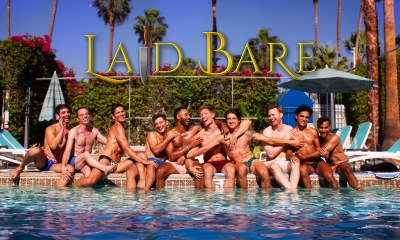
 Television20 hours ago
Television20 hours ago‘Laid Bare’ isn’t your typical sexy slasher
-

 Books3 days ago
Books3 days agoLove or fear flying you’ll devour ‘Why Fly’
-

 a&e features6 hours ago
a&e features6 hours ago35 years after ‘Truth or Dare,’ Slam is still dancing
-
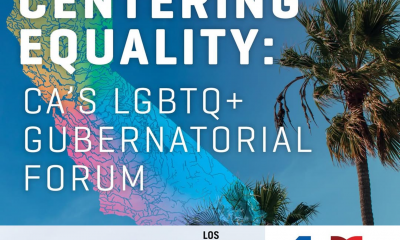
 California Politics4 hours ago
California Politics4 hours ago“I’ve always been an ally.” Seven gubernatorial candidates discuss LGBTQ+ rights at recent forum



